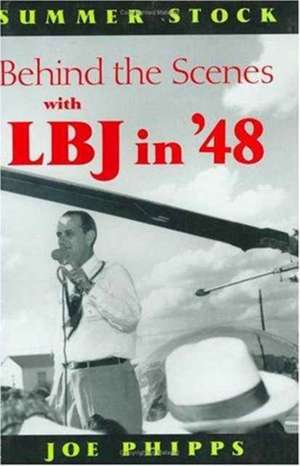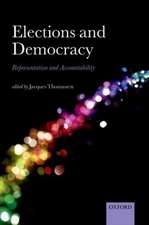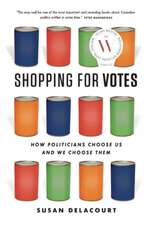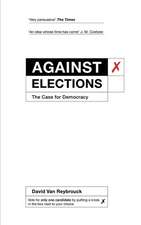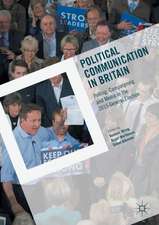Summer Stock: Behind the Scenes with LBJ in '48
Autor Joe Phippsen Limba Engleză Hardback – 31 dec 1991
Preț: 167.21 lei
Nou
Puncte Express: 251
Preț estimativ în valută:
32.00€ • 33.32$ • 27.04£
32.00€ • 33.32$ • 27.04£
Carte disponibilă
Livrare economică 17 februarie-03 martie
Preluare comenzi: 021 569.72.76
Specificații
ISBN-13: 9780875651071
ISBN-10: 0875651070
Pagini: 346
Dimensiuni: 160 x 236 x 30 mm
Greutate: 0.76 kg
Ediția:New.
Editura: Texas Christian University Press
ISBN-10: 0875651070
Pagini: 346
Dimensiuni: 160 x 236 x 30 mm
Greutate: 0.76 kg
Ediția:New.
Editura: Texas Christian University Press
Textul de pe ultima copertă
In the summer of 1941, Congressman Lyndon Baines Johnson ran for the U.S. Senate in a special election. He lost. It was the only political race LBJ ever lost, and he always claimed that W. Lee "Pappy" O'Daniel had stolen the office from him. In the summer of 1948, Johnson ran again for the Senate. This time his chief opponent in the Democratic primaries was former Texas Governor Coke Stevenson. After much counting and recounting of ballots, Johnson was declared the winner of the runoff, or second primary, by just eighty-seven votes out of millions cast, votes that Stevenson claimed Johnson bought in deep South Texas - the stomping grounds of George Parr, "the Duke of Duval County". Joe Phipps signed on as a volunteer player in this summer stock production, taking a role as general aide and "go-fer" for the Congressman. Then a young World War II veteran with experience in radio broadcasting, Phipps did not imagine that he would assume a major part in an election that would change not only the face of Texas politics but the way campaigners were promoted then and the way campaigns would be prosecuted in the future. Not only were the short radio broadcasts Phipps produced innovative, but Johnson's method of campaigning was new to voters. Rather than concentrate on urban areas, Johnson acquired a helicopter - an exotic new flying object at the time - and took his message to people all across Texas. It may well have been the votes garnered by LBJ in the rural counties that kept him in the race and eventually sent him to the United States Senate. Much of the drama of the summer of '48 is well known and has been told many times by political historians and Johnson biographers. Unlike previouswriters, however, Joe Phipps was there for most of the hectic campaign, working closely with Lyndon Johnson, the consummate politician - complex and contradictory, yet a simple man - on a daily basis as aide and confidant. Phipps sat in radio studios with the candidate, flew in the helicopter on the stump, met with the Congressman in Johnson's home at Austin, and confided with him in hotel rooms on the road. Joe Phipps' narrative graphically exposes the human side of the pivotal events of the summer of '48.
